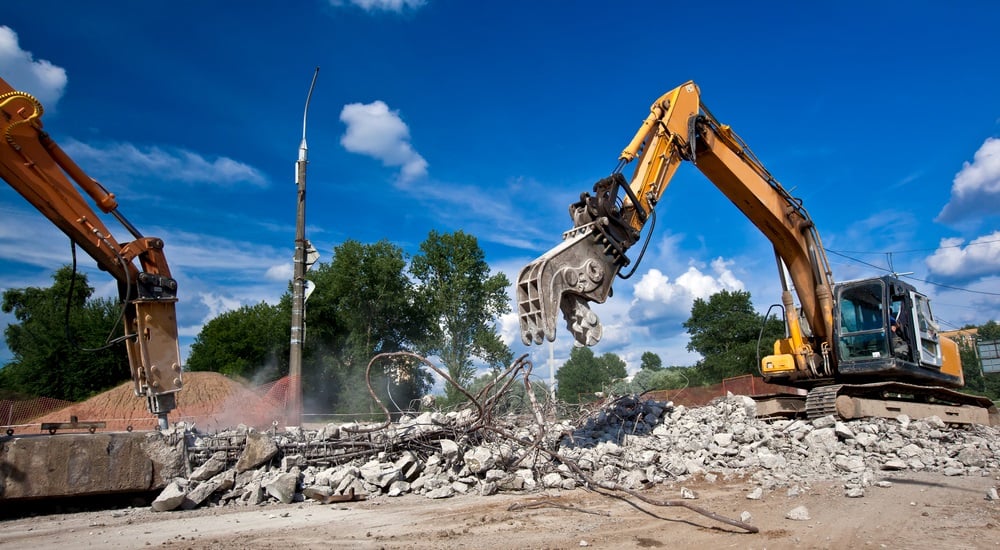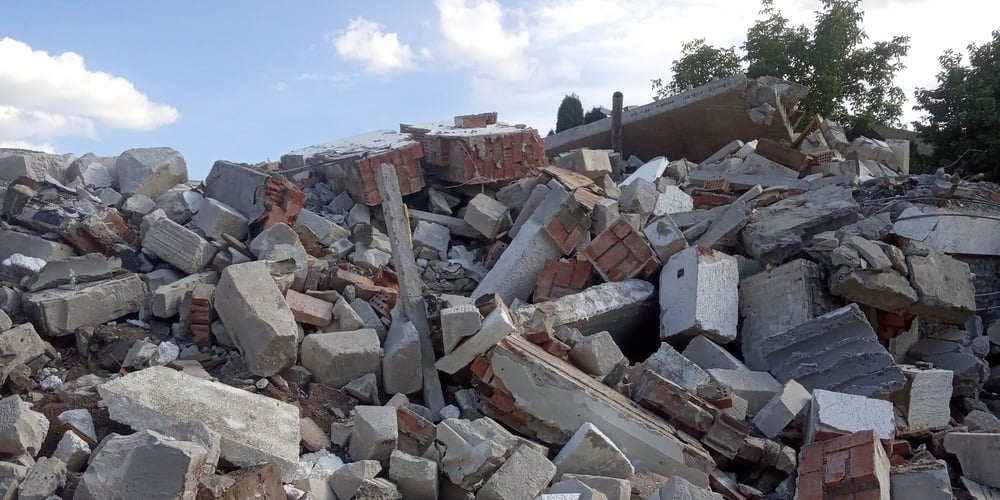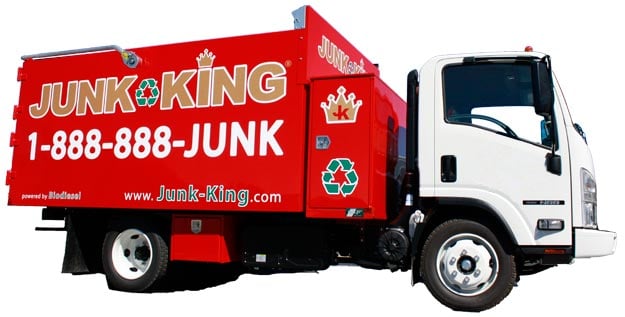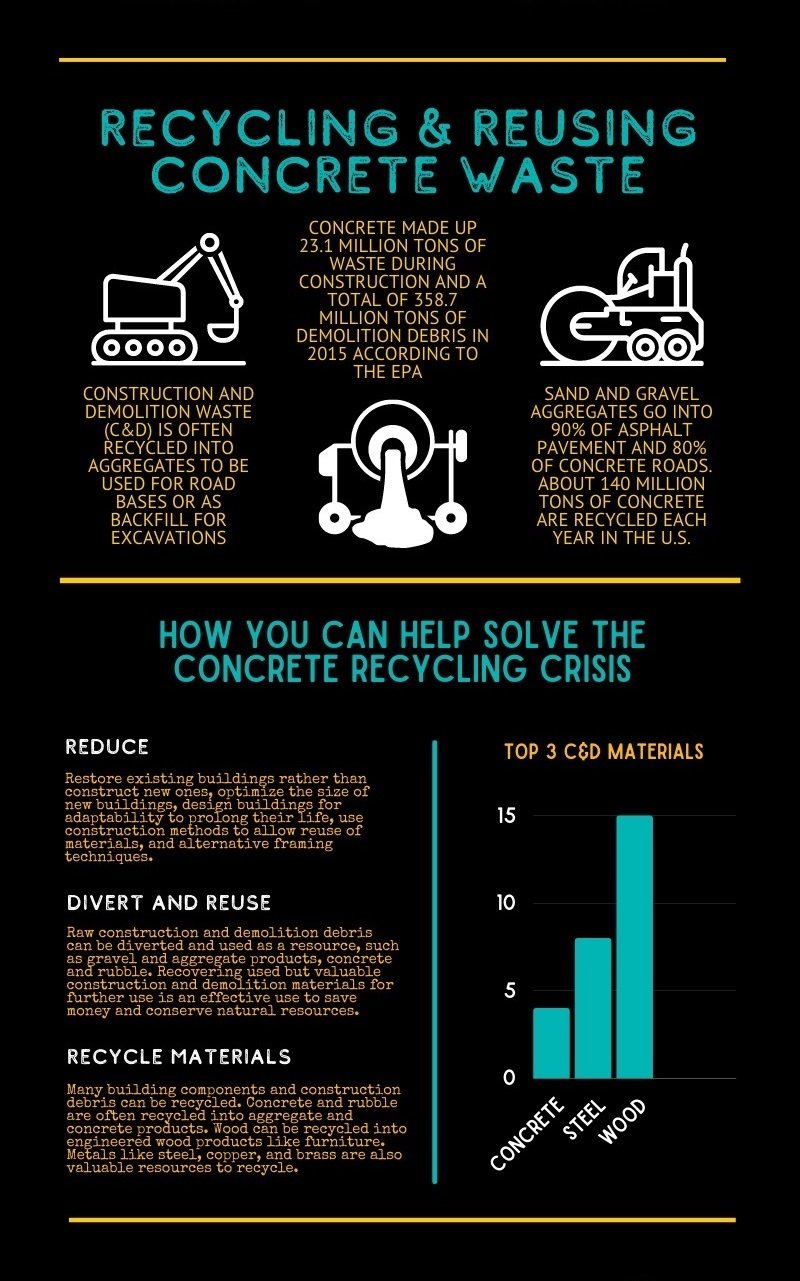
[This article was first published here in July 2015 and has been updated and revised.]
Concrete disposal is difficult work and can even be dangerous because it is heavy and unwieldy. And even transporting concrete debris can be a challenge.
Disposal of concrete debris requires careful planning for proper removal and hauling, but it also provides great opportunities for recycling and reuse.
The Burden of Concrete Debris Disposal
Construction waste removal and disposal has always been one of the more problematic aspects of the building and construction industry. And to make matters worse, we produce a great deal of it.
In California, for example, CalRecycle estimated that construction and demolition (C&D) materials account for between 21.7 to 25.5 percent of California's waste disposal. And nationally, the Environmental Protection Agency estimates that 230 million to 600 million tons of C&D are produced nationwide each year in the United States.
What that works out to is, in just one year, C&D debris accounts for more than two thirds of the municipal solid waste generated in the U.S.
And annual construction waste is expected to reach 2.2 billion tons globally by 2025.

While it is not normally classified as a hazardous waste material, the EPA's rules defining those types of materials can be a bit confusing, especially when it comes to waste products such as concrete and masonry debris and rubble.
For example, according to one article,
"The EPA defines hazardous wastes in several ways, one of them being whether or not it is what is called a 'characteristic' hazardous waste. Does the waste meet certain stated characteristics?”
Based on standards established by the EPA, if a material has a pH greater than 12.5, as most cement does, it is then considered a corrosive material, which defines it as a hazardous waste material.
Simply put, disposal of concrete is not a simple thing.
Proper Disposal of Concrete: Recycling or Dumping?
Regardless of which option you choose, the proper handling and disposal of concrete rubble always needs to be taken into consideration. That being said, pursuing other options besides using your local landfill can be beneficial.
Unfortunately, the vast amount of construction (and subsequent demolition) that is carried out across the United States each year produces a vast amount of debris. And much of it ends up in our landfills.
A few statistics from the Environmental Protections Agency (EPA) drives home this point:
- Construction and demolition projects filled U.S. landfills with almost 145 million tons of waste in 2018.
- More than 75 percent of all construction waste from wood, drywall, asphalt shingles, bricks and clay tiles ends up in landfills.
- Concrete and asphalt concrete made up 85 percent of all U.S. C&D waste in 2018.
Fortunately, a great deal of the concrete debris that is not simply disposed of in landfills is re-purposed in a number of ways.
In fact, concrete recycling is an increasingly common method of utilizing the rubble. At one time, concrete was commonly trucked to landfills for disposal, but the benefits of recycling has made it a more attractive option, especially in light of more stringent environmental laws, and for keeping construction costs down.
3 Good Reasons Your Disposal of Concrete Should Include Recycling
It’s a good practice to keep any material out of the landfill, if possible, and the durability and potential for reuse of concrete debris makes it a great candidate for recycling. However, getting it off-site and hauled away is still a potentially costly and time-consuming proposition if you choose to do it yourself.
Three reasons to recycle your waste concrete material:
- Reduced costs of removing and hauling
- Elimination of high landfill fees
- Contributes to the production of lower-cost recycled aggregate products
And aside from the economics of choosing a firm to take your concrete debris to a recycling plant, there are a variety of benefits in recycling concrete rather than dumping it or burying it in a landfill, such as:
- Keeping concrete debris out of landfills saves landfill space
- Using recycled material as gravel reduces the need for gravel mining
- Using recycled concrete as the base material for roadways reduces the pollution involved in trucking material
Here's a graphic look at some of the more significant facts around concrete debris recycling:
Earth-Friendly Disposal of Concrete and Recycling
One of the advantages of making use of a professional disposal firm is knowing that your waste material will find new life as recycled aggregate while reducing the impact on existing landfills.
Recycled aggregate can be used:
- In paved roads as aggregate base, aggregate sub-base, and shoulders
- In gravel roads as surfacing
- As base for building foundations
- As fill for utility trenches
Portland cement concrete and asphalt concrete consist primarily of aggregate and the cement and asphalt serve as binders. In addition, concrete debris will often contain steel reinforcement bars, or "rebar" which adds to the mix. The concrete debris usually shows up at the processor in chunks so heavy crushing equipment is used to break up the chunks into aggregate.
A crushing plant receives the material and then breaks it into more manageable pieces. These go into some type of impact crusher to reduce its size even further and then through a vibrating screen to sort the crushed material to specific sizes. Finally, a conveyor belt moves the aggregate past a rotating magnet to remove metal contamination including rebar.
The end result is referred to as recycled aggregate. After processing, the rocks retain bits of cement or asphalt and are used primarily as aggregate base and sub-base in road projects.
Recycling Concrete Debris and Best Practices - The Easy Way!
For most contractors and builders, the fastest, easiest way to properly dispose of concrete debris is by calling Junk King.
Junk King provides an efficient, safe and eco-friendly construction waste disposal service so you don’t need to worry about the pick up or disposal of the debris after your project is complete. Whether you need our services several times during a construction project or just once after it is complete, our hauling professionals will ensure that the construction debris is out of your way so that you can get on with the job.
Our professional and insured hauling team will call 15 to 30 minutes before we arrive at your site and we’ll give you a free estimate based on how much room your debris takes up in our truck.
And we'll load your construction waste into our junk removal trucks and remove it all without any hidden fees.
Our team specializes in construction debris removal and we can often be at your facility in mere minutes, so call us today! Our crew is fully insured and well-trained, so you can trust them to get rid of your unwanted items in a professional and courteous fashion.
And one of the best things about hiring Junk King is that we recycle as much of the material we pick-up as possible. This is proof of our commitment to being an eco-friendly removal service.
So, ready to get rid of your concrete debris and have it recycled? It's as easy as 1,2,3.
If you have questions about what we can do for you just give us a call at 1-888-888-JUNK (5865).







